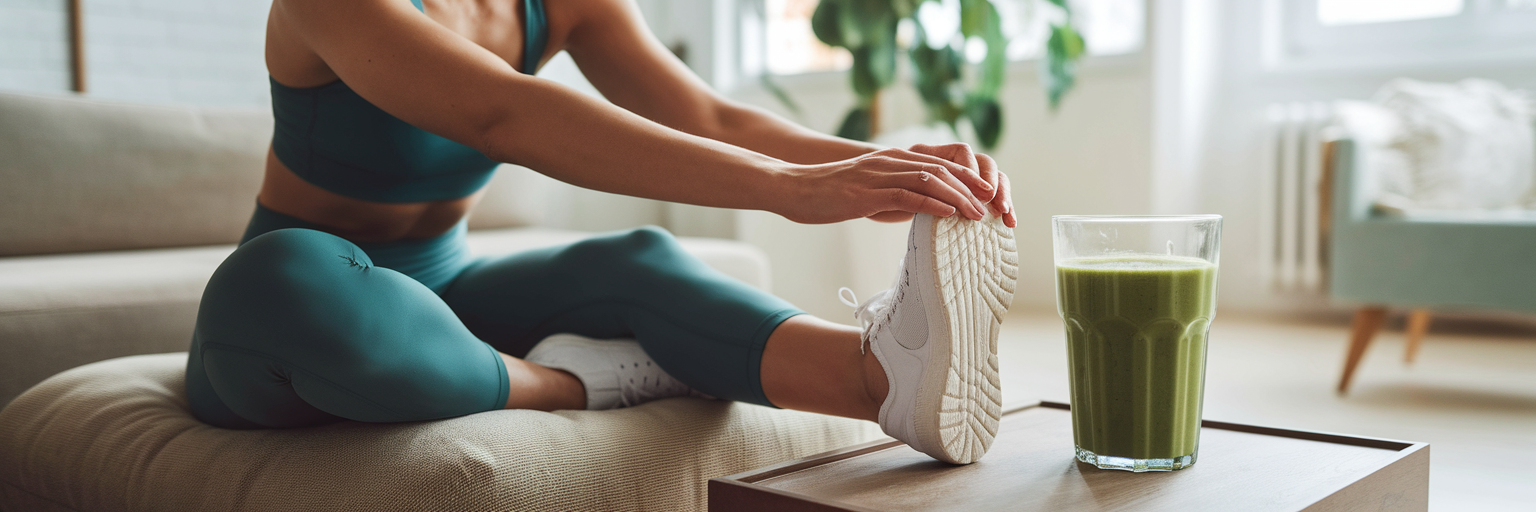El dolor post-entrenamiento y una respuesta basada en plantas
A todos nos ha pasado. Terminas un entrenamiento genial, sintiéndote fuerte y realizado. Luego, uno o dos días después, te despiertas con esa rigidez familiar y satisfactoria. Bajar las escaleras de repente se siente como un gran evento deportivo. Esto es el dolor muscular de aparición tardía, o DOMS, y en realidad es algo bueno. Es una señal clara de que tus músculos están respondiendo al desafío, adaptándose y fortaleciéndose.
Lo que ocurre a nivel microscópico es bastante sencillo. El ejercicio intenso crea pequeños desgarros en las fibras musculares. El dolor que sientes forma parte del proceso natural de inflamación y reparación del cuerpo. Para reconstruir estas fibras más fuertes que antes, tu cuerpo necesita materias primas específicas, y ahí es donde la nutrición juega un papel fundamental.
Aquí es donde podemos introducir una herramienta poderosa para tu kit de recuperación: proteína vegana para la recuperación muscular . Durante años, un mito persistente sugirió que las dietas basadas en plantas no podían respaldar objetivos de acondicionamiento físico serios. Afortunadamente, esa idea está muy desactualizada. Un enfoque bien planificado y basado en plantas no solo proporciona los componentes básicos esenciales para la reparación, sino que también ofrece algunas ventajas únicas en la lucha contra el dolor muscular.
Cómo la proteína vegana combate la reparación muscular

Entonces, ¿cómo ayuda exactamente una porción de proteína en tu batido a aliviar esos músculos doloridos? La magia reside en un proceso llamado síntesis de proteína muscular (MPS). Piénsalo como el equipo de construcción interno de tu cuerpo. Después de un entrenamiento, este equipo está en alerta máxima, listo para reparar las microlesiones en tus músculos. El consumo de proteínas proporciona los bloques de construcción esenciales que necesitan: los aminoácidos.
Cuando bebes un batido de proteínas o comes una comida rica en proteínas, tu cuerpo la descompone en estos aminoácidos, que luego se transportan a tus músculos para comenzar el trabajo de reparación. Este proceso no solo ayuda a construir nuevo tejido muscular, sino que también puede reducir la duración y la intensidad del dolor. Pero las proteínas vegetales ofrecen un doble beneficio convincente. Muchas están naturalmente repletas de antioxidantes y fitonutrientes que ayudan a controlar la inflamación, un factor clave del dolor posterior al entrenamiento. Por ejemplo, la proteína de cáñamo es una fuente de ALA omega-3, conocidos por sus propiedades antiinflamatorias.
Esto no es solo teoría. Una revisión sistemática de 2025 publicada en PubMed concluyó que las proteínas de origen vegetal pueden ser tan efectivas como el suero de leche para la recuperación muscular cuando se consumen cantidades adecuadas. Los aminoácidos correctos en las proteínas veganas alimentan la reparación de manera efectiva. Comprender estos fundamentos es clave para optimizar tu camino hacia el fitness. Para obtener más información sobre nutrición y rendimiento, nuestro blog es un gran recurso.
El rompecabezas de los aminoácidos en las proteínas vegetales.
Una de las preguntas más comunes sobre el fitness vegano gira en torno a los aminoácidos. Es posible que hayas oído hablar de proteínas "completas" e "incompletas". Una proteína completa contiene los nueve aminoácidos esenciales que nuestro cuerpo no puede producir por sí solo. Uno de ellos, la leucina, es particularmente importante, ya que actúa como el principal desencadenante de la síntesis de proteínas musculares.
Es cierto que algunas fuentes individuales de proteína vegetal pueden ser más bajas en ciertos aminoácidos en comparación con el suero de leche. Sin embargo, este es un factor fácilmente manejable, no un obstáculo. La solución es maravillosamente simple: variedad. Durante generaciones, las culturas de todo el mundo han combinado naturalmente alimentos para crear perfiles de proteínas completos, como el arroz y los frijoles. Su cuerpo es lo suficientemente inteligente como para agrupar los aminoácidos de diferentes comidas a lo largo del día.
Las modernas proteínas vegetales en polvo para el dolor muscular lo hacen aún más fácil. Las mezclas de alta calidad, como las que combinan proteína de guisante y arroz, están formuladas específicamente para proporcionar un perfil de aminoácidos robusto y completo, rico en leucina. También puedes apoyar tu recuperación incorporando una variedad de alimentos integrales. Convertir estos ingredientes en una deliciosa comida post-entrenamiento es más fácil de lo que piensas. Para inspirarte, echa un vistazoa estas tres sencillas recetas veganas de proteínas que realmente desearás probar.
| Fuente de alimento | Proteína por cada taza (cocida) | Beneficio clave de la recuperación |
|---|---|---|
| Lentejas | ~18 g | Rico en fibra y hierro para dar energía. |
| Garbanzos | ~15 g | Buena fuente de carbohidratos complejos para el glucógeno. |
| Quinua | ~8 g | Una proteína completa con los 9 aminoácidos esenciales. |
| Tofu (firme) | ~20 g | Alto contenido en proteínas y versátil para las comidas. |
| Semillas de cáñamo (3 cucharadas) | ~10 g | Contiene ácidos grasos omega-3 con propiedades antiinflamatorias. |
Nota: El contenido de proteína es aproximado y puede variar según la preparación. Estos alimentos integrales son excelentes adiciones a una dieta enfocada en la recuperación.
Perfeccionando el tiempo de ingesta de proteínas para la recuperación

Has terminado tu última serie y ahora el tiempo corre, ¿verdad? Puede que hayas oído hablar de la "ventana anabólica", un supuesto periodo de 30 minutos después del entrenamiento en el que tus músculos están preparados para recibir proteínas. Si bien es cierto que tus músculos son muy receptivos a los nutrientes después del ejercicio, la ventana no es tan estrecha como podrías pensar.
Esta idea puede generar estrés innecesario. Todos hemos visto a alguien bebiendo un batido frenéticamente en el vestuario. La buena noticia es que puedes relajarte un poco. Según la Sociedad Internacional de Nutrición Deportiva , consumir proteínas hasta dos horas después del entrenamiento es ideal para favorecer la reparación muscular. La clave es la constancia, no las prisas. Esto hace que encontrar la mejor proteína vegana después del entrenamiento sea un objetivo mucho más manejable.
Otra estrategia poderosa para tu recuperación vegana después del entrenamiento es el consumo de proteína antes de dormir. Ingerir una porción de proteína entre 30 y 60 minutos antes de acostarte puede alimentar la síntesis de proteína muscular mientras duermes, aprovechando al máximo los ciclos naturales de reparación nocturna de tu cuerpo. Un batido rápido y delicioso es una de las maneras más fáciles de satisfacer tus necesidades de proteína. Nuestra proteína vegana de chocolate está formulada para un gran sabor y una recuperación efectiva.
Más allá de las proteínas: Un plan de recuperación vegano holístico.
Si bien las proteínas son fundamentales para la recuperación, funcionan mejor en equipo. Para reducir realmente el dolor muscular al estilo vegano , es importante tener una visión más amplia. Piensa en tu recuperación como un sistema completo donde cada parte apoya a las demás. Aquí hay algunos elementos clave para incluir en tu plan:
- Los carbohidratos son tus amigos: Después de un entrenamiento intenso, el glucógeno muscular (tu principal fuente de energía) se agota. Los carbohidratos son esenciales para reponerlo. También ayudan a transportar los aminoácidos a las células musculares de manera más eficiente. Procura una comida o refrigerio con una proporción de carbohidratos a proteínas de aproximadamente 3:1.
- Combate la inflamación con alimentos: Aprovecha el poder antiinflamatorio natural de las plantas. Añade bayas ricas en antioxidantes a tu batido después del entrenamiento, espolvorea cúrcuma en tus comidas e incorpora semillas ricas en omega-3 como el lino y la chía a tu dieta.
- Hidrátate, hidrátate, hidrátate: La deshidratación puede empeorar el dolor muscular y ralentizar todo el proceso de recuperación. Tus músculos son aproximadamente un 75% agua, por lo que mantenerlos hidratados es imprescindible para una función y reparación óptimas.
- Prioriza el sueño de calidad: El sueño es la herramienta de recuperación definitiva. Es cuando tu cuerpo libera la hormona del crecimiento y dedica la mayor parte de sus recursos a reparar los tejidos dañados. Intenta dormir entre 7 y 9 horas de sueño de calidad cada noche.
Una comida perfecta para la recuperación podría ser un tazón de quinoa con frijoles negros, aguacate y una guarnición de brócoli al vapor. Combina proteínas, carbohidratos complejos, grasas saludables y micronutrientes. Crear un kit de herramientas completo para la recuperación es un camino personal. Siéntase libre de explorar nuestra gama completa de suplementos diseñados para apoyar sus objetivos de bienestar.
Tu plan de acción para la recuperación basada en plantas
¿Listo para poner todo esto en práctica? Una estrategia de recuperación inteligente no tiene por qué ser complicada. Concéntrate en unos pocos hábitos clave y podrás recuperarte más rápido y sentirte más fuerte para tu próxima sesión. Aquí tienes una sencilla lista de verificación para empezar:
- Calcula bien el tiempo (sin estrés): Intenta consumir entre 20 y 40 gramos de proteína vegana de alta calidad en las dos horas siguientes a terminar tu entrenamiento.
- Concéntrese en fuentes completas: Elija una mezcla de proteínas bien formulada o procure consumir una variedad de fuentes de proteína vegetal a lo largo del día.
- No te olvides de los carbohidratos: Acompaña tu proteína con una fuente de carbohidratos saludables para reponer energía y favorecer la absorción de nutrientes.
- Cubre tus necesidades básicas: Mantente hidratado y prioriza un sueño de calidad. Tu cuerpo realiza su mejor trabajo de reparación mientras descansas.
Una dieta vegana bien planificada es una herramienta poderosa para cualquier entusiasta del fitness. ¿Te sientes inspirado para mejorar tu recuperación? Explora nuestra gama de proteínas vegetales en Beyond Good Foods y encuentra la opción perfecta para tu rutina. Y si te ha resultado útil, ¡compártelo con un compañero de entrenamiento!



